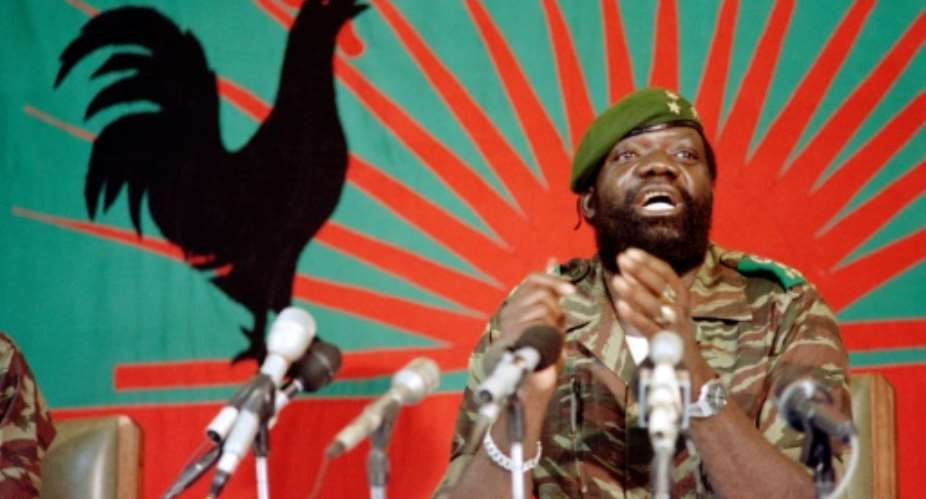Nanterre (France) (AFP) - The children of slain Angolan rebel chief Jonas Savimbi will try to convince a French court Wednesday that the wildly popular video game "Call of Duty" defamed their father by representing him as a "barbarian".
Three of Savimbi's children, who live in the Paris region, are seeking one million euros in damages from the French branch of Activision Blizzard which makes Call of Duty, the world's best-selling video game last year.
The first-person shooter often features characters based on historical and political figures, but the violent role of Savimbi has incensed his children.
"Seeing him kill people, cutting someone's arm off ... that isn't Dad," said Cheya Savimbi, 42.
Savimbi was the founder and leader of the National Union for the Total Independence of Angola (UNITA), which fought a 27-year civil war with the government in Luanda.
He was in part a product of larger historical forces that turned his newborn country into a Cold War battlefield as the United States and apartheid South Africa, on one hand, and the Soviet Union and Cuba, on the other, fed the conflict with soldiers, arms and cash.
Savimbi was known to have terrorised civilian populations and became one of the first warlords to fund his army with so-called "blood diamonds".
He was killed in battle against MPLA government forces in 2002, paving the way for a peace deal that would bring an end to one of Africa's longest and bloodiest conflicts, which erupted after independence from Portugal in 1975.
The war left at least half a million people dead and forced some four million civilians to flee their homes in the oil-rich nation.
As charismatic as he was controversial, the bearded Savimbi often appeared in uniform with a cocked red beret.
- 'We must finish them' -
Ten years after his death, it was this war figure his children discovered when "Call of Duty" released its "Black Ops II" game in 2012.
The offending clip shows Savimbi, known as the "Black Cockerel" by his supporters, rallying his troops from the back of a tank as the MPLA advances on them, gunfire rattling all around.
He yells out phrases such as "fight, my brothers" and "we must finish them... death to the MPLA".
The mission is to rescue a man named Frank Woods, who at one point says: "Our dog in the fight was a guy named Jonas Savimbi."
The family's lawyer Carole Enfert said Savimbi is represented as a "big halfwit who wants to kill everybody", an "outrageous" image that does not reflect his personality as a "political leader and strategist".
"A warlord, yes, (but) he was an important person in the Cold War, he was a friend of (Nelson) Mandela," she said.
The game's publishers disagree that they misrepresented Savimbi.
Etienne Kowalski, a lawyer for Activision Blizzard, said Savimbi is shown in a "rather favourable light" as a "good guy who comes to help the heroes".
The complaint also notes that his son, who closely resembles his father, is often "recognised in the street as the character" from the game.
It is not the first time that historical and political figures have appeared as characters in "Call of Duty".
Cuba's Fidel Castro, slain former US president John F Kennedy and former Panama dictator Manuel Noriega have all made appearances.
Noriega filed a lawsuit in 2014 in the United States complaining that the game portrayed him in a bad light, but the case was thrown out.





 Dumsor must stop vigil part 2: We’ll choose how we demonstrate and who to partne...
Dumsor must stop vigil part 2: We’ll choose how we demonstrate and who to partne...
 2024 elections: NDC stands on the side of morality, truth; NPP isn't an option —...
2024 elections: NDC stands on the side of morality, truth; NPP isn't an option —...
 Akufo-Addo has moved Ghana from 'Beyond Aid' to ‘Beyond Borrowing’ — Haruna Idri...
Akufo-Addo has moved Ghana from 'Beyond Aid' to ‘Beyond Borrowing’ — Haruna Idri...
 Train crash: NDC is full of evil mindset; driver who 'deliberately' parked the c...
Train crash: NDC is full of evil mindset; driver who 'deliberately' parked the c...
 Dumsor: Energy Minister must be fired; it’s becoming unbearable — IES
Dumsor: Energy Minister must be fired; it’s becoming unbearable — IES
 #DUMSORMUSTSTOP: IMANI responds to Yvonne Nelson's call for a joint vigil
#DUMSORMUSTSTOP: IMANI responds to Yvonne Nelson's call for a joint vigil
 'Obiara b3didi' — Manhyia South NPP Chairman fights for resourcing of NPP grassr...
'Obiara b3didi' — Manhyia South NPP Chairman fights for resourcing of NPP grassr...
 Dumsor: This thing is becoming unbecoming, collapsing our business — Nana Ofori ...
Dumsor: This thing is becoming unbecoming, collapsing our business — Nana Ofori ...
 Dumsor: It'll be no more by the end of April — Gideon Boako assure Ghanaians
Dumsor: It'll be no more by the end of April — Gideon Boako assure Ghanaians
 "I can now see clearly with my two eyes, thanks to the generosity of Afenyo-Mark...
"I can now see clearly with my two eyes, thanks to the generosity of Afenyo-Mark...
